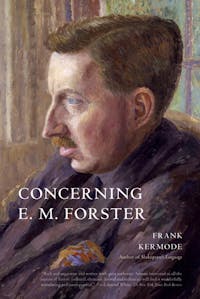Concerning E. M. Forster
 Download image
Download image
ISBN10: 0374532389
ISBN13: 9780374532383
Trade Paperback
192 Pages
$14.00
This impressive new book by the celebrated British critic Frank Kermode examines hitherto neglected aspects of the novelist E. M. Forster's life and work. Kermode is interested to see how it was that this apparently shy, reclusive man should have claimed and kept such a central position in the English writing of his time, even though for decades he composed no fiction and he was not close to any of his great contemporaries—Henry James, Ford Madox Ford, Joseph Conrad, James Joyce.
Concerning E. M. Forster has at its core the Clark Lectures that Kermode gave at Cambridge University in 2007 on the subject of Forster, eighty years after Forster himself gave those lectures, which became Aspects of the Novel. Kermode reappraised the influence and meaning of that great work, assessed the significance of Forster's profound musicality (Britten thought him the most musical of all writers), and offered a brilliant interpretation of Forster's greatest work, A Passage to India. But there is more to Concerning E. M. Forster than that. Thinking about Forster vis-àvis other great modern writers, noting his interest in Proust and Gide and his lack of curiosity about American fiction, and observing that Forster was closest to the people who shared not his literary interests or artistic vocation but, rather, his homosexuality, Kermode's book offers a wise, original, and persuasive new portrait not just of Forster but of twentieth-century English letters.
Reviews
Praise for Concerning E. M. Forster
"An extraordinarily packed, balanced, and wise book."—William H. Pritchard, Commonweal
"A subtle and fascinating book of criticism that obeys the delightful vagaries of rhythm more than the inflexibility of pattern . . . With great authority Kermode places Forster in the artistic context of his times . . . It is rich and suggestive and written with quiet authority. Anyone interested in all the 'aspects of fiction' (cultural, thematic, formal and technical) will find it wonderfully stimulating and consequential."—Edmund White, The New York Times Book Review
"Noted literary critic Kermode presents in part his 2007 Clark lectures at Trinity College, Cambridge, given eight decades after Forster's own Clark lectures (published as Aspects of the Novel) and in part a 'causerie' ('a loosely organized sequence of observations'), in which 'Forster is reduced in size, placed in a wider context, and occasionally scolded.' Kermode provides erudite and good-humored insights into Forster's artistic philosophies, plus deft analyses of the techniques of Forster's contemporaries, such as Henry James (whose style Forster disliked), Virginia Wolfe, Ford Madox Ford and Forster favorite Marcel Proust. Enlarging on Benjamin Britten's remark that Forster was 'our most musical novelist,' Kermode shows how musical 'transformation and return of phrases was an art he practiced with success in his novels.' Kermode makes the case that Forster's homosexuality was the reason for 'his long abstention from fiction' and establishes that Forster placed himself in a 'cultivated minority' above the working classes. Kermode is a delightful mentor for readers wishing to reflect not only on Forster's "creativity but on the personal and social circumstances that restricted it."—Publishers Weekly
"The renowned British critic Kermode has published many volumes of criticism, including studies of Shakespeare and D.H. Lawrence, as well as a memoir. Here, he focuses on the works and character of 20th-century English novelist and essayist E.M. Forster. The first half contains the three Clark lectures given by Kermode at Cambridge in 2007. The first lecture discusses Forster's Aspects of the Novel, the second looks at Forster's love of classical music, and the third examines A Passage to India, which Kermode considers Forster's greatest novel. The second half, titled 'E.M. Forster: A Causerie,' is a free-form rambling commentary on the writer's literary style and personality traits. Such a meandering method presents a well-rounded portrait of the author, warts and all, and it allows Kermode to praise Forster while pointing out aspects of the writer that perplex him."—Morris Hounion, NYC Coll. of Technology Lib., CUNY, Library Journal


